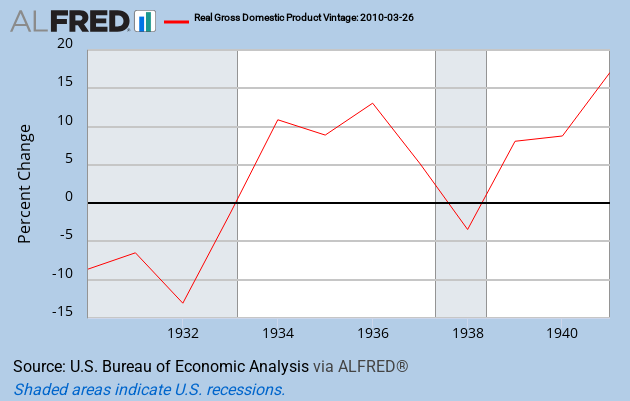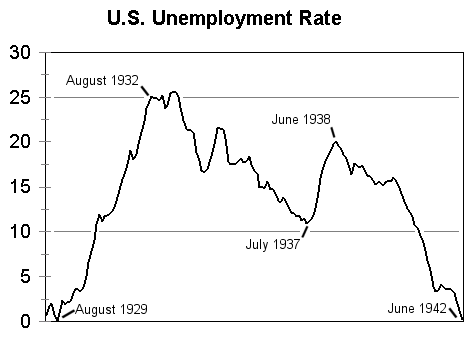
When most people think of the Great Depression, they think about the entire decade of the 1930s, beginning with the stock market crash of October 1929 and ending with WW2. Would it surprise you to find out that the economy grew rapidly during the mid 1930s? In fact, the mid 1930s represented the strongest period of economic growth in the last 80 years other than during WW2.

That's why some economists like Milton Friedman have labeled 1929-33 as "the Great Contraction" since technically the recession ended in 1933. So why do most people include the whole decade as the Great Depression? The contraction of the early 1930s was so deep, that real GDP didn't return to its pre-Depression level until 1937 (and nominal GDP didn't return to its previous high until 1941). Though official figures for the unemployment rate are not available, it's estimated that the unemployment rate rose from 3.2% prior to the Depression to a high of 24.9% in early 1933. The rapid growth of the mid 1930s caused it to decline significantly, but it was still above 10% at its low in 1937. Another recession took place in 1937-38, driving it up to about 18% and it remained above 15% until WW2 (see below).

What caused the Great Depression? There was a financial panic accompanied by a series of banking crises. The Federal Reserve was created following the Panic of 1907 to act as a lender of last resort in the event of a financial panic. According to Milton Friedman (Capitalism and Freedom), "The Reserve System stood idly by. In the face of an unprecedented liquidation of the commercial banking system, the books of the lender of last resort show a decline in the amount of credit it made available to member banks...A temporary reversal of policy in 1932 involving the purchase of $1 billion of government bonds slowed down the rate of decline [of the money supply]. Had this measure been taken in 1931, it would almost surely have been sufficient to prevent the debacle..." Thus Friedman thought that if the Fed engaged in quantitative easing and lent funds to banks, we could have avoided the Great Depression. In 2002, Ben Bernanke, then a member of the Fed, made the following statement at a celebration of Milton Friedman's 90th birthday - "Let me end my talk by abusing slightly my status as an official representative of the Federal Reserve. I would like to say to Milton and Anna: Regarding the Great Depression. You're right, we did it. We're very sorry. But thanks to you, we won't do it again."